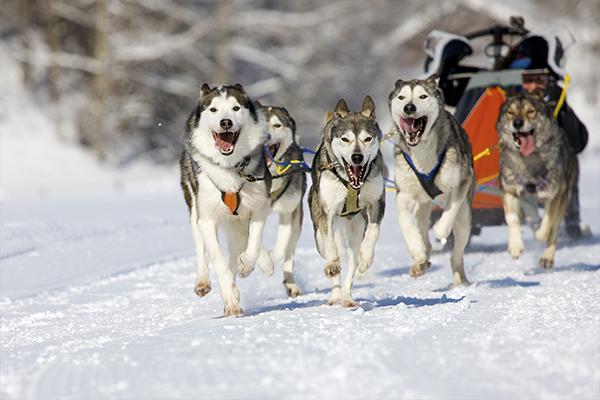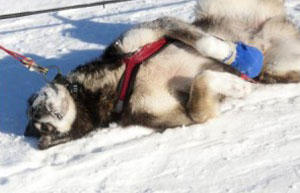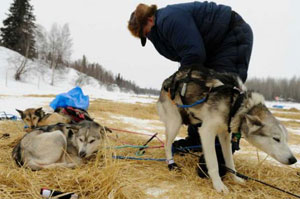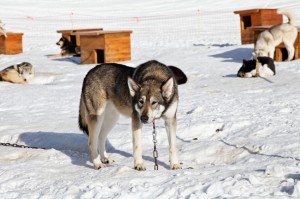Interaction - Dog Sledding (Mushing)

Although at first glance mushing may seem a harmless activity, it still involves the use of animals for our entertainment, or cash prizes, as a tourist attraction or in competitions. And as such, although in many cases these activities are carried out in a responsible way, there are cases of abuse, neglect or exploitation.
Sustained strenuous exercise can compromise the health of the dogs. As a result of the intense effort they have to endure during the races, many dogs pull muscles, incur stress fractures, or become sick with diarrhea, dehydration, intestinal viruses, or bleeding stomach ulcers. When racing, dogs can lose up to 5 kilos. Their feet get torn apart by ice and distance. Sometimes animals freeze to death or drop dead on the trail. Others die after the race due to lactic acid buildups, or others, that are a direct consequence of muscle breakdown that poison the liver and the kidneys. They may also be involved in accidents with snowmobiles or choke to death on their harness.

In many cases the animals spend their days (and sometimes nights) tied up on snowy grounds, although they are sometimes given a blanket or straw, they have to endure extreme weather conditions. The dogs are kept tethered for long periods of time or permanently prevented from engaging in their natural behaviors, which causes them frustration and can lead to abnormal behaviors such as aggression, anxiety or neurotic behavior, and may also lead to hyper-vigilance and therefore lack of sleep. Tethered animals are also three times more likely to bite than those that are not.
Dogs are social animals and need companionship and interact with people and other dogs. There is no difference between the needs of a companion dog and a dog used for these purposes.
According to the Vancouver Humane Society, a Canadian organization, a country where mushing is very common, there are numerous cases of owners who dispose of the animals when they no longer perform or are not profitable enough anymore by shooting them in the head. In fact, an Alaskan musher confirmed this as a fact saying that it is part of the circle of life of a sled dog.They also point out that it is a common practice to kill unwanted puppies, those who do not make the grade for not possessing monumental stamina and speed. Apparently, sometimes their 4 incisor teeth get pulled painfully to avoid possible dog fights or attacks on humans.

During the off-season, many of these animals live in appalling conditions without proper care and food, "stored" as mere objects and often tethered on short ropes or chains or living in cramped, substandard kennels. When transported, these dogs should be able to stand and sit comfortably and be protected against extreme weather conditions. Unfortunately this is not always the case.
During the Iditarod Trail Sled Dog Race held each year in Alaska and covering 1,000 km in a maximum of 14 days (the record is less than 9) one third of the participating dogs have to be taken out off the race because they die, get sick, are injured or exhausted from being forced to run for hours on rough terrain and in extreme wind and snow conditions.
In January 2005, the Journal of Veterinary Internal Medicine published a study showing that 61% of the sled dogs studied exhibited an increased frequency of gastric erosions or ulcers after completing the Iditarod, none of whom had exhibited such symptoms before the race. Another study published in the American Journal of Respiratory and Critical Care Medicine found that 81% of dogs in this race showed "abnormal accumulations" of mucus or cellular debris in the lower airways.

Even some mushers admit that dogs suffer: Hans Gatt reported that half of his team was "sick and ate badly," probably because of upper respiratory infections. Four-time champion Lance Mackey said that he did not know what was wrong with his dogs, but that he had watched his "world-class dog team falling apart before my very eyes." Paul Gebhardt had to forfeit the race when his dogs couldn't continue because of dehydration, cramps, and injuries. And Zoya DeNure had to perform mouth-to-snout resuscitation on one of her dogs, who had collapsed in his harness.
Due to the inability to ensure the welfare of animals during these events, some sponsors like Chevron and Discovery Channel have pulled the plug on their donations.
